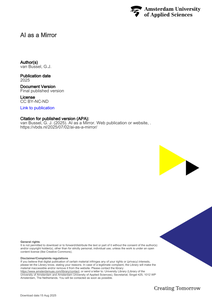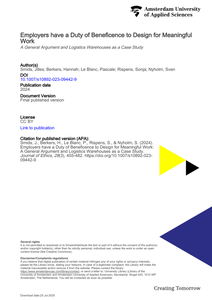The role and ethics of professionals in business and economics have been questioned, especially after the financial crisis of 2008. Some suggest a reorientation using concepts such as craftsmanship. In this article, I will explore professional practices within the context of behavioural theory and business ethics. I suggest that scholars of behavioural theory need a strategy to deal with normative questions to meet their ambition of practical relevance. Evidence-based management (EBMgt), a recent behavioural approach, may assist business ethics scholars in understanding how professionals infer ‘evidence’ to make decisions. For a professional, ethical issues are an integral part of decision-making at critical moments. As reflective practitioners, they develop insights related to ethical concerns when collecting and assessing evidence within decision-making processes.
DOCUMENT

Thesis: Ethics work (Banks 2012, 2016) is a stimulating concept for the ethical improvement of inter-professional cooperation. Outline: Starting point: ideal-typical professionalism Introduction to ethics work Professionalism requires inter-professional cooperation Inter-professional expansion of ethics work Final remarks and further challenges
DOCUMENT

In this article, we describe a study on the impact of an ethics program aimed at strengthening the ethical agency of 15 social workers of three welfare organizations. The goal of the study was to make an inventory of the impact of the program, and to evaluate the relevance of this impact with the help of several stakeholders. The most significant change (MSC) approach was used as a research strategy, though some changes to the approach were made with a view to our research goal. We explain the MSC approach and how we used it in our study design. Further, we describe the research process, answering the question whether our adaptation of the MSC was helpful to inventory the impact of our ethics program and the evaluation of its relevance. The implications of MSC's focus on "most significant" changes and the need for a thorough feedback of the results of the evaluation process in the participating organizations are discussed.
MULTIFILE

Book Review of S. Vallor (2024). The AI Mirror. How to Reclaim Our Humanity in an Age of Machine Thinking. Oxford University Press, New York, 263 p.
MULTIFILE

This thesis is about dilemmas, discretionary space and ethics in public welfare. In my position as a lecturer of ethics in socio-legal practices I am concerned with the way in which these practices open up to an ethical development of their professionals. Thus, this thesis is a search for the most fundamental themes and issues in understanding and judging public welfare as a, perhaps, ethical socio-legal practice. In the field of public services professionals function as the intermediary between government and citizen. In their daily work public welfare professionals take care of the important societal task and goal of poverty alleviation. During the last decades, public welfare has developed into a civil right that involves many obligations on the part of the client in return. The requirement to see to it that the client fulfils these obligations has complicated the public welfare professional’s task of helping citizens in need.
DOCUMENT

Artificial intelligence-driven technology increasingly shapes work practices and, accordingly, employees’ opportunities for meaningful work (MW). In our paper, we identify five dimensions of MW: pursuing a purpose, social relationships, exercising skills and self-development, autonomy, self-esteem and recognition. Because MW is an important good, lacking opportunities for MW is a serious disadvantage. Therefore, we need to know to what extent employers have a duty to provide this good to their employees. We hold that employers have a duty of beneficence to design for opportunities for MW when implementing AI-technology in the workplace. We argue that this duty of beneficence is supported by the three major ethical theories, namely, Kantian ethics, consequentialism, and virtue ethics. We defend this duty against two objections, including the view that it is incompatible with the shareholder theory of the firm. We then employ the five dimensions of MW as our analytical lens to investigate how AI-based technological innovation in logistic warehouses has an impact, both positively and negatively, on MW, and illustrate that design for MW is feasible. We further support this practical feasibility with the help of insights from organizational psychology. We end by discussing how AI-based technology has an impact both on meaningful work (often seen as an aspirational goal) and decent work (generally seen as a matter of justice). Accordingly, ethical reflection on meaningful and decent work should become more integrated to do justice to how AI-technology inevitably shapes both simultaneously.
DOCUMENT

The idea that technologies influence society—both positively and negatively—is not new. This is mainly the terrain of the philosophy and the ethics of technolo-gy research. Similarly, design research aims to help create new technologies in line with individual, social, and societal needs and values. Against this backdrop, it seems essential to expose relations between design and philosophy of tech-nology research, particularly from a methodological perspective. The main goal of this paper is to suggest a preliminary overview of methods and approaches that can inspire and inform interdisciplinary collaboration and, with that, sys-tematic engagement with ethics in design processes. Through interdisciplinary exchange, we propose a preliminary typology of ethics-informed methods and approaches based on two main dimensions, namely theory-grounded approaches to theoretically-flexible techniques and assessment to accompaniment. This mapping intends to help navigate the ethical qualities of selected methods from both disciplines, and it aims to create a platform for fruitful interdisciplinary conversations.
MULTIFILE

The idea that technologies influence society—both positively and negatively—is not new. This is mainly the terrain of the philosophy and the ethics of technolo-gy research. Similarly, design research aims to help create new technologies in line with individual, social, and societal needs and values. Against this backdrop, it seems essential to expose relations between design and philosophy of tech-nology research, particularly from a methodological perspective. The main goal of this paper is to suggest a preliminary overview of methods and approaches that can inspire and inform interdisciplinary collaboration and, with that, sys-tematic engagement with ethics in design processes. Through interdisciplinary exchange, we propose a preliminary typology of ethics-informed methods and approaches based on two main dimensions, namely theory-grounded approaches to theoretically-flexible techniques and assessment to accompaniment. This mapping intends to help navigate the ethical qualities of selected methods from both disciplines, and it aims to create a platform for fruitful interdisciplinary conversations.
MULTIFILE

People with disabilities (PWDs) face discrimination in the hospitality workplace. The aim of this paper is therefore to frame issues surrounding the employment of PWDs in the hospitality industry in normative ethical terms. To achieve this aim, we conducted twenty-eight semi-structured interviews with owners/managers of hospitality businesses and other relevant stakeholders. Drawing on the ethics of justice and ethics of care, our study found that when organisations demonstrated to their employees and other stakeholders the fairness in the procedures taken to implement PWD inclusion actions, the inclusion actions were significantly supported by coworkers, and the organisations were able to achieve distributive justice and care for PWDs. This study, thus, demonstrated that organisational members were willing to take part in caring actions for employees with disabilities (EWDs) not only when they perceived that inclusion actions for EWDs were procedurally fair, but also when they perceived that the PWDs deserved distributive justice outcomes.
MULTIFILE
Een betere financiële sector bereik je sneller met deugden dan met regels. Toch wordt na iedere missstand de regelgeving aanscherpt, zonder dat er iets wezenlijks verandert. Regels krijgen we opgelegd, deugden horen bij onszelf. Het denken van Alisdair MacIntyre biedt verdiepende inzichten hierin.
MULTIFILE